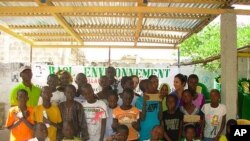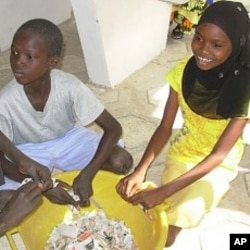Diourbel is a semi-desert region in Senegal that has suffered the combined effects of climate change, deforestation, waste mismanagement and endemic poverty. But, in the city of Diourbel, 50 bright, young students are making a positive environmental contribution by adopting a recycling project that provides a cost-effective, alternative fuel source for cooking.
Learning basics
Awa Deme and Bamba Ngom crouch down next to a large plastic bin, and begin churning a sloppy brown and white pulp with their tiny hands. In the background, their instructor, Ibrahima Faye, coaches them. The other young boys and girls sit perched on their chairs, clambering for their own turns to get their hands into this goopy paper paste.
It is Saturday morning at Baol Environment, a green oasis sheltered from the scorching heat and whirling gusts of dust and sand so common to Diourbel. While most kids are at home, sleeping or playing, this energetic group of young school children is gathered for their weekly meeting. It is a type of environment club that involves some of the city’s best students, between the ages of 9 and 11, from five local schools. Here they learn the basics in trash collecting, recycling and reusing.
Baol Environment
Today the kids are making paper briquettes. It is a simple recipe of waste paper, peanut shells, sawdust and water. The mix is placed into a metal press, formed into rectangular paper bricks, and set on the roof to dry in the sun. Using old rice bags, the children collect the waste paper from their schools, homes and yards and haul them into Baol Environment. Here the kids rip and shred the paper, and finally transform it into little brown bricks that replace charcoal, gas and wood for cooking. The cost of making a single brick is little more than a few cents, and each one burns long enough to prepare a local meal of rice and fish.
April Muniz, a Peace Corps volunteer with Baol Environment, is helping with the paper briquette project.
“I think what makes this project unique is that we’re trying to combine a lot of elements and make it a holistic approach to environmental work," said Muniz. "Our paper briquette project is one small project that we are doing within the eco-ecole program, but it is one that covers a lot of bases. It covers the issue of trash in our environment. It covers the issue of the importance of recycling. It covers the issue of reforestation. It covers the issue of alternative fuel sources.
"So it is a project that has been able to wrap up a lot of the concepts that we have been trying to teach into one very tangible project that kids can get their hands on," continued Miniz. "They can stick their hands into a bucket of water, play together and really understand and be able to apply those concepts.”
Economy
Diourbel is in the center of Senegal’s agricultural basin. But it is an area that has suffered since massive droughts swept through the region in the late 1970s and 1980s, reducing the staple millet and groundnut crops. Many people here continue to live off less than a couple dollars a day, and with the costs of fuel rising, they can easily spend the same amount on charcoal as they do on rice.
Ibrahima Faye is the president of the Baol Environment and has been living in the region of Diourbel for 35 years.
Faye says kids look at what is happening around them and they watch how their parents behave and how they live. Their parents have lived through at least two or three cycles of dry spells that have completely changed customs in the region. This means that these kids have no recollections of what Diourbel was like in the past. And what they have found is an incredible lack of sanitation, disrespect for rules and a vicious level of poverty that has even forced families apart.
Trash in Diourbel
Today, Diourbel’s landscape is a barren sea of brown, dotted with colorful mounds of litter. Waste management is a major problem throughout Senegal. But in Diourbel, particularly, there are not even garbage cans in the schools.
Moussa Diallo is a principal at one of the elementary schools in Diourbel and has 10 students involved in the Baol environment program.
Diallo says people here generally do not have a culture of managing garbage. It is not in their mind-set to properly dispose of trash. But even if this did start happening, they are confronted by another problem - how to get rid of it. Today it is actually the poor people who use their wagons and carts to move the garbage out.
The paper briquette project is still in its early stages, but the Baol environment team has big plans for its expansion. The group works with more than 500 women from surrounding villages, and hopes to introduce these paper bricks into their cooking practices as a healthier and cost-effective alternative - one that helps save trees and cleans up their environment.





